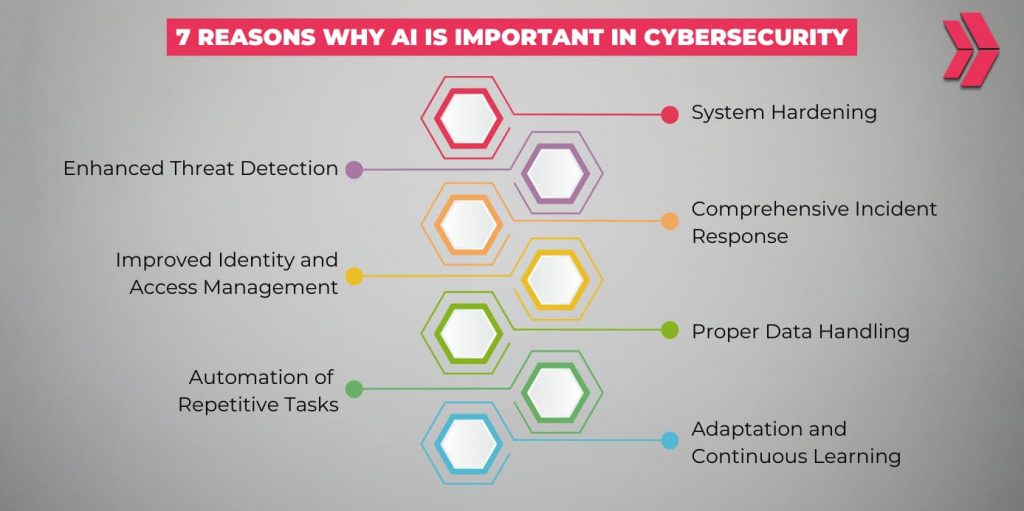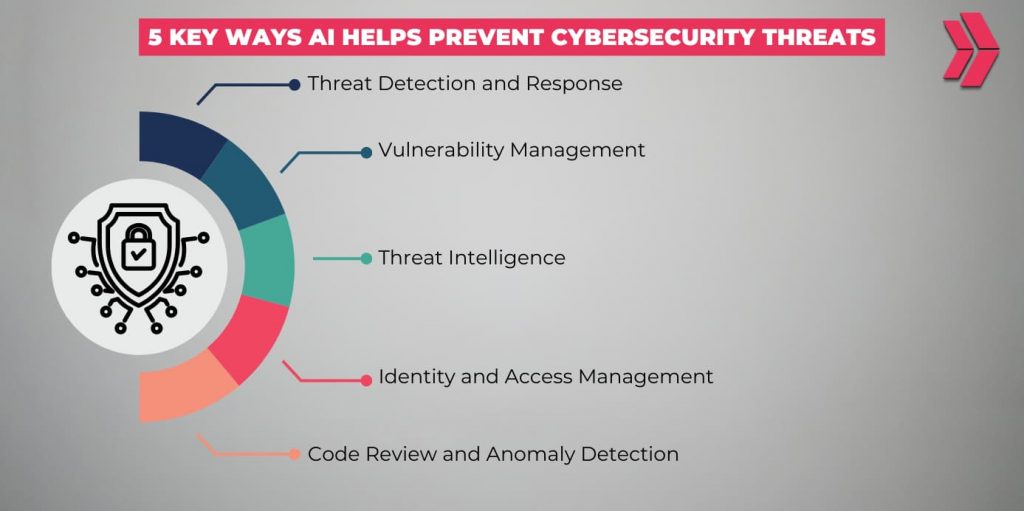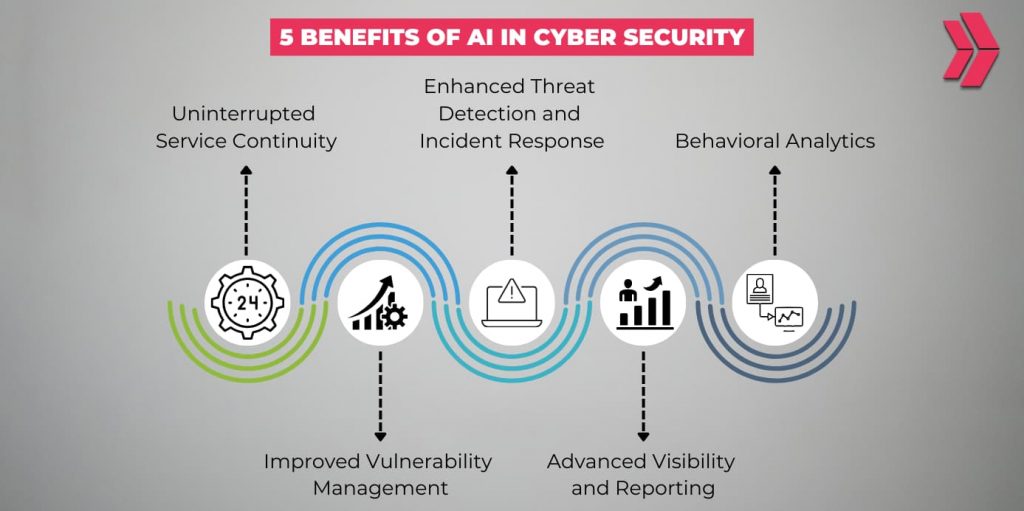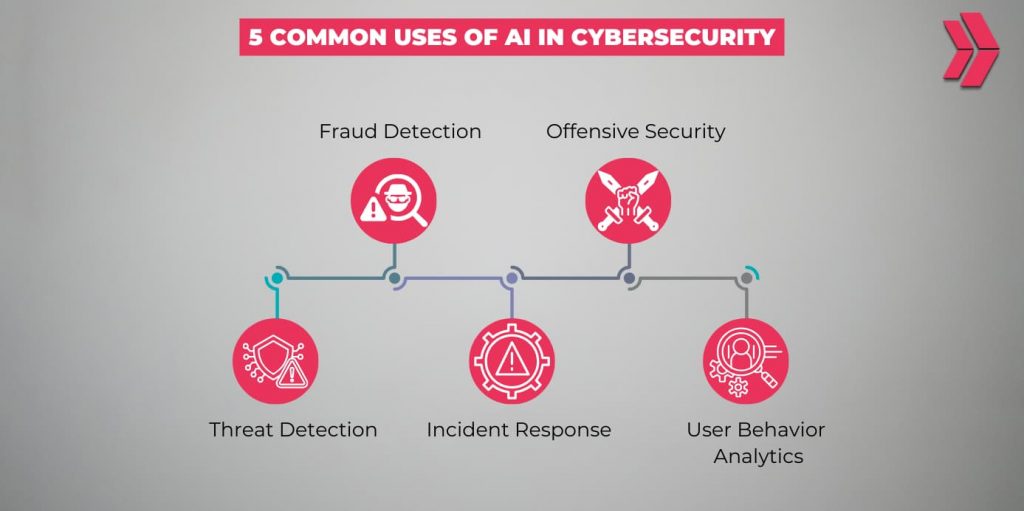Integrating artificial intelligence (AI) into cybersecurity introduces a new technological era. Leveraging AI is crucial in the digital landscape as cyber threats increase in complexity and severity. In the previous year, the global market for AI in cybersecurity was estimated to be around US$22.1 billion and projected to reach US$115 billion by 2032, according to Dimension Market Research.
AI can effectively identify, mitigate, and respond to cyber threats, and it is instrumental in vulnerability and risk management. For instance, implementing AI cybersecurity solutions reduced response time to cyber attacks by up to 40%, as reported in Exabeam research.
Professionals who learn and understand how to effectively utilize AI in cybersecurity through dedicated cybersecurity training and security best practices will better prepare organizations against increasingly sophisticated cyber threats.
This article will discuss the benefits and common uses of AI in cybersecurity and the functions and utilization of AI tools such as ChatGPT to illuminate AI and cybersecurity coherence.

What is AI (Artificial Intelligence) in Cybersecurity?
Artificial Intelligence (AI) in cybersecurity is an advanced technology that safeguards the digital environment from cyber threats. Artificial intelligence in cyber security incorporates complex methods to optimize security efforts. AI in cyber security is a force multiplier that helps security professionals analyze large amounts of data, recognize patterns, and identify unusual activities. By integrating AI and cybersecurity, security practitioners can detect and mitigate cyber-attacks and strengthen overall resilience in a rapidly changing threat landscape. AI is a powerful resource that boosts human capabilities.
Why is AI Crucial in Cybersecurity?
The significance of AI for cybersecurity is indispensable for many reasons, including threat detection, response, and prevention. Here are the 7 main reasons why AI is crucial in cybersecurity:
- System Hardening
- Enhanced Threat Detection
- Comprehensive Incident Response
- Improved Identity and Access Management
- Proper Data Handling
- Automation of Repetitive Tasks
- Adaptation and Continuous Learning

System Hardening:
AI proactively identifies and mitigates cyber threats before they escalate, reducing the attack surface. Additionally, proper vulnerability management and risk assessment strengthen security measures.
Enhanced Threat Detection:
AI technology improves security by utilizing enhanced threat detection methods. AI systems use machine learning and cutting-edge algorithms to identify patterns. Hence, many organizations use AI for cybersecurity to recognize threats.
Comprehensive Incident Response:
Artificial intelligence (AI) significantly improves the efficiency of automated incident response procedures. Therefore, IT professionals can adeptly manage cybersecurity incidents and mitigate potential damages.
Improved Identity and Access Management:
Integrating artificial intelligence and sophisticated algorithms has greatly improved identity management and access control measures. Using AI in cybersecurity results in more precise and effective monitoring and control measures.
Proper Data Handling:
AI offers superior capabilities in processing and analyzing large data sets compared to human abilities. Additionally, AI excels in decision-making and interpreting complex data, with high accuracy and efficiency in these tasks.
Automation of Repetitive Tasks:
By automating specific security processes, AI helps save time, staff, and resources. Additionally, it eliminates unnecessary burdens and enables professionals to focus on real threats. AI can potentially diminish false positives by up to 86%, according to 2024 Help Net Security research.
Adaptation and Continuous Learning:
Artificial intelligence can rapidly adapt to emerging situations. It can also consistently learn from previous incidents and respond proactively to enhance defensive measures against sophisticated attacks.
How Does AI Help Prevent Cybersecurity Threats?
The role of AI in threat detection is unquestionably pivotal, and its significance continues to grow. Here are the 5 fundamental ways how AI helps prevent cybersecurity threats:
- Threat Detection and Response
- Vulnerability Management
- Threat Intelligence
- Identity and Access Management
- Code Review and Anomaly Detection

Threat Detection and Response
Real-time monitoring enhances threat detection capabilities. Additionally, automated incident response facilitates mitigation of security breaches. So, integrating AI into cybersecurity for threat detection and incident response provides more robust control over the digital environment.
Vulnerability Management
Artificial intelligence is essential in identifying and mitigating vulnerabilities within networks and systems. By effectively managing compromised vulnerabilities, AI helps to reduce the potential attack surface, thereby minimizing the risk of security breaches.
Threat Intelligence
Threat intelligence offers invaluable insights for constructing predictive models and preempting cyber attacks. Accordingly, artificial intelligence is pivotal in forecasting future threats and contributes significantly to threat-hunting efforts.
Identity and Access Management (IAM)
Leveraging AI for IAM can facilitate operations by automating specific tasks. Implementing AI enhances user experience and improves functional effectiveness by confirming that only permitted users can access related resources.
Code Review and Anomaly Detection
Vulnerabilities in software code pose a significant security risk. AI-powered code review tools successfully identify potential issues that human reviewers may overlook. In addition, AI anomaly detection analyzes user behaviors to pinpoint deviations.
What Benefits Does AI in Cybersecurity Provide?
AI enhances organizations’ overall security posture and, therefore, is critical for security efforts. Here are the 5 main benefits of AI in cyber security:
- Uninterrupted Service Continuity
- Improved Vulnerability Management
- Enhanced Threat Detection and Incident Response
- Advanced Visibility and Reporting
- Behavioral Analytics

1. Uninterrupted Service Continuity:
AI ensures uninterrupted service continuity. It provides 24/7 support and mitigates human factors such as fatigue, distraction, and stress. Additionally, AI continually updates itself to remain current.
2. Improved Vulnerability Management:
Artificial intelligence identifies potential vulnerabilities, provides practical recommendations, and takes proactive measures to preempt cyber threats.
3. Enhanced Threat Detection and Incident Response:
Real-time monitoring and swift responses to cyber attacks contribute to a secure digital landscape and support protective capabilities for cybersecurity.
4. Advanced Visibility and Reporting:
AI generates comprehensive and focused reports before an attack or for post-incident analysis. It provides in-depth documentation and visual representations for clear interpretation.
5. Behavioral Analytics:
The advantages of utilizing AI include overseeing access and authentication procedures. Furthermore, AI can analyze user behaviors and identify irregularities within patterns.
What Are the Common 5 Uses of AI in Cybersecurity?
Artificial intelligence is extensively employed across various technological fields. Here are the 5 common uses of AI in cybersecurity:
- Threat Detection
- Fraud Detection
- Incident Response
- Offensive Security
- User Behavior Analytics

Threat Detection
AI-based malware detection and prevention solutions, such as antivirus and anti-malware tools, efficiently identify and block malware using machine learning techniques. These sophisticated solutions significantly enhance security by leveraging advanced algorithms to mitigate malicious software proactively.
Fraud Detection
AI has advanced capabilities for detecting email scams and phishing attempts. Thoroughly analyzing sender information, content, and attachments, AI effectively prevents users from falling victim to fraudulent activities.
Incident Response
AI efficiently responds to security breaches. It automatically takes required actions, such as isolating compromised systems and preventing malicious network traffic. It can also start backup and recovery processes.
Offensive Security
AI proactively identifies concealed threats that might go undetected through manual analysis. Additionally, it enhances user experience by utilizing offensive security tools, contributing to a more robust security posture.
User Behavior Analytics
Artificial intelligence consistently monitors user activity to identify anomalies or potentially suspicious behaviors. It can recognize unusual patterns, unauthorized access attempts, or internal security threats that may indicate potential security vulnerabilities.
What is the Role of AI Tools like ChatGPT in Cybersecurity?
AI tools can enhance cybersecurity strategies by analyzing large amounts of data, revealing possible weaknesses, and recognizing patterns. But what is ChatGPT’s role in offensive cybersecurity? ChatGPT fulfills crucial functions in threat identification, incident response, predictive analysis, vulnerability management, access control, and user training.
How Does Cybersecurity Training Incorporate AI?
Cybersecurity training incorporates AI in several ways to enhance effectiveness and efficiency, such as interactive training modules, chatbots, incentives, tailored learning paths, and gamification. By utilizing AI in cybersecurity training, professionals can gain the knowledge, skills, and awareness to fight against evolving cyber threats.
How Does AI Influence Different Types of Cybersecurity?
Integrating AI technology strengthens defense mechanisms and positively impacts different types of cybersecurity, including endpoint, cloud, application, and network security. In endpoint security, AI monitors and blocks malicious activities and unauthorized access by analyzing behavioral patterns. Cloud security benefits from AI’s oversight in enhancing access controls and identifying potentially suspicious actions. Moreover, AI improves application security by identifying and rectifying vulnerabilities. Furthermore, in network security, AI detects anomalies and preempts potential threats.
Conclusion
Nowadays, AI has an indispensable role in cybersecurity efforts. AI presents enhanced security measures in advanced threat detection, incident response, and user authentication. By automating tasks, AI provides cost-effective solutions and ensures up-to-date protection.
AI enhances operational efficiency and maintains confidentiality, integrity, and data availability. Therefore, participating in a cybersecurity course that leverages AI contributes to improving the security posture of individuals and organizations and making meaningful contributions to global security endeavors.




